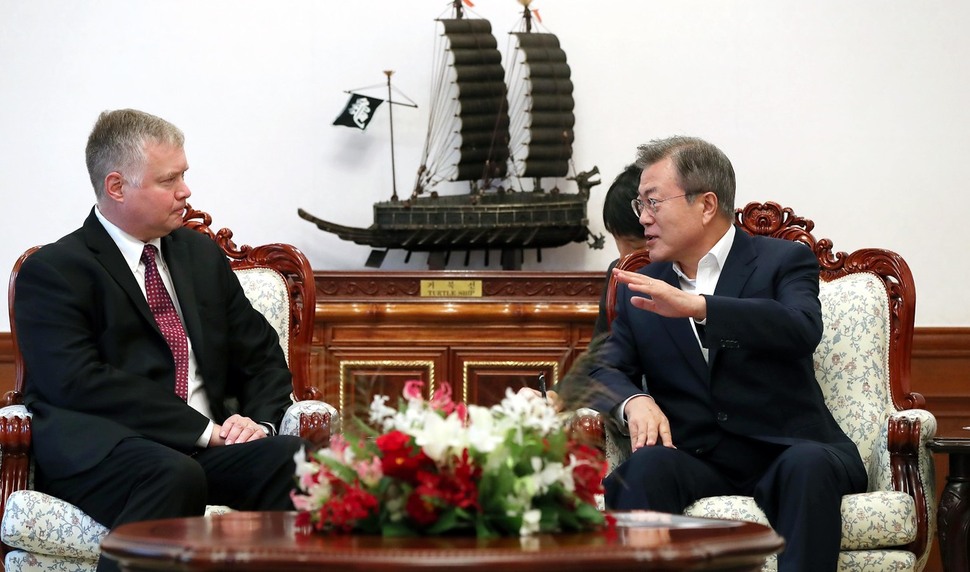 |
|
South Korean President Moon Jae-in speaks with US Special Representative for North Korea Stephen Biegun at the Blue House on Sept. 11. (provided by the Blue House)
|
President asks US special representative on North Korea to help improve inter-Korean relations
On Sept. 11, South Korean President Moon Jae-in met with Stephen Biegun, the US State Department’s new special representative for North Korea, at the Blue House. During their meeting, Moon asked Biegun to take advantage for the mood for dialogue that has been rekindled by the special delegation’s recent visit to North Korea to ensure that the denuclearization talks get good results, the Blue House reported. Moon emphasized to Biegun that South Korea and the US need to keep working closely together to create a virtuous cycle between improving inter-Korean relations (through opening the inter-Korean liaison office, for example) and North Korea-US denuclearization talks. It’s notable that Moon directly emphasized South Korea-US cooperation in connection with the opening of the inter-Korean liaison office. The opening ceremony for a joint liaison office in Kaesong that will be permanently staffed by officials from the two sides, as specified in the Apr. 27 Panmunjom Declaration, is scheduled to be held on Sept. 14. Until recently, the US government has been critical of the opening of the office. Moon also said that South Korea and the US share the exact same goals, namely the denuclearization of the Korean Peninsula; that wide-ranging dialogue is necessary to overcome 70 years of distrust and hostile relations between North Korea and the US, and that the South Korean government will play every role available to it in the process of denuclearization. He also asked Biegun to play a constructive role in the denuclearization talks and in building a permanent peace system moving forward. The Blue House reported that Biegun responded by saying that he felt a grave sense of responsibility for the role he had been given, that he hoped for the success of the inter-Korean summit in Pyongyang and that he would do his best to make progress in denuclearization on the Korean Peninsula and in establishing peace. Moon’s personal meeting with Biegun was likely motivated by diplomatic courtesy for the special representative’s first visit to South Korea. Another factor, however, appears to have been Moon’s belief in the importance of securing the US’s cooperation in a situation where the Korean Peninsula is moving toward another crucial crossroads amid the growing possibility of a second North Korea-US summit following the special delegation’s visit to the North. Chung and Biegun in closed-door deliberations The closed-door deliberations between Blue House National Security Office Director Chung Eui-yong and Biegun can also be understood in the same context. This was Chung’s first chance to meet a senior official in the US government in person since he returned from his meeting with North Korean leader Kim Jong-un on Sept. 5 as the leader of Moon’s special delegation to the North. And among the senior South Korean government officials whom Biegun met during his visit to South Korea on Sept. 10, Chung was the only one who had been a member of the special delegation. No doubt, a lot was said during Chung and Biegun’s closed-door discussions. Biegun was accompanied to South Korea by Mark Lambert, acting deputy assistant secretary at the US State Department, and Allison Hooker, director for Korea on the White House National Security Council. While these are not the highest ranking officials in their departments, they are key officials who deal with Korean Peninsula affairs in the Trump administration. Attempts to resolve Korean Peninsula issues will likely be benefited by the two officials having a chance to hear about Moon’s plans and Chung’s explanation of his meeting with Kim. Prior to his courtesy call on Moon, Biegun had a series of meetings with South Korean Foreign Minister Kang Kyung-wha, Unification Minister Cho Myung-gyon and Lee Do-hoon, special representative for Korean Peninsula peace and security affairs. Over the course of a single day, Biegun held three back-to-back meetings with Lee, his counterpart in the deliberations: dinner on Monday and breakfast and another meeting on Tuesday. “We have some hard work to do,” Biegun told reporters as he kicked off his meeting with Lee. “But we also have a tremendous opportunity created by President Donald Trump and by President Moon Jae-in and by North Korean leader Kim Jong-un.” “We need to do everything we can to make the most of this moment of opportunity.” “I heard there is a Korean proverb that the beginning is half done. And this is the beginning. So what we need to do is to finish the job,” Biegun said. Possibility of second stop by Biegun following trilateral Asian tour Reports suggest that Biegun is seriously considering the idea of dropping by South Korea on his way home for additional deliberations after wrapping up trips to China and Japan from Sept. 12 to 15. It will be interesting to see the results of the additional deliberations between South Korea and the US if Biegun does make an unusual second stop in South Korea following his tour of South Korea, China and Japan. By Kim Ji-eun, Noh Ji-won and Seong Yeon-cheol, staff reporters Please direct comments or questions to [english@hani.co.kr]






